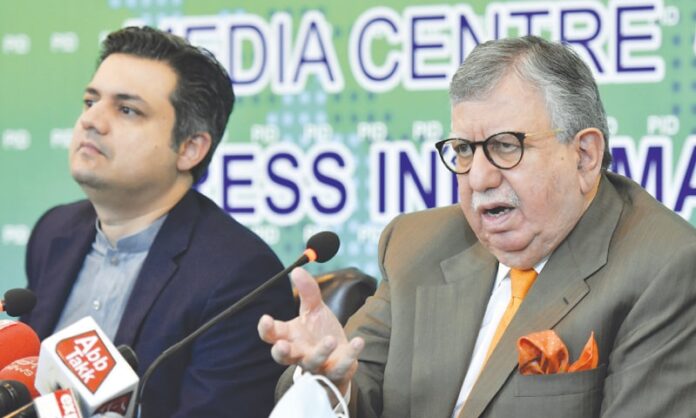ISLAMABAD: The federal government has hinted at raising the petroleum levy (PL) by Rs4 per litre every month as well as increasing the electricity tariff in a bid to ensure implementation of of pre-conditions set by the International Monetary Fund (IMF) to complete the sixth review under the $6 billion Extended Fund Facility (EFF).
In this regard, in a press conference with Federal Minister for Energy Hammad Azhar on Monday, Advisor to Finance and Revenue Shaukat Tarin said that the PL has to be increased by Rs4 every month for reaching the maximum level of Rs30 per litre although the government has reduced the PL target to Rs310 from Rs610 billion.
Tarin said that the staff-level agreement with the Fund has been successfully completed for reviving the $6-billion funding programme stalled since April this year. He also said that the World Bank as well as the Asian Development Bank (ADB) would also provide funds after the approval from IMF’s executive board.
“However, Pakistan has to implement five major prior actions, including approval of the SBP autonomy as well as tax exemptions bills from the parliament before the board meeting scheduled on January 12, 2022,” he said.
In this connection, he said that the government and IMF have agreed on the draft of the SBP autonomy bill and that the government would give autonomy to the central bank in making decisions regarding the monetary policy and exchange rate policy.
“We believe in it. God willing, we will get it (the legislation) passed,” Tarin added.
However, he clarified that the central bank would be answerable to parliament like other organisations such as the National Accountability Bureau (NAB) and all NAB laws would be applicable to the SBP.
The advisor said that the government has also revised the revenue target for the ongoing fiscal year (FY22) which would now be Rs6.1 trillion instead of Rs5.8 trillion.
It may be recalled that the IMF had asked Pakistan to impose Rs700 billion taxes or withdraw exemptions in March. The finance advisor said that the government has so far withdrawn Rs350 billion exemptions and withdraw another Rs350 billion more in sales tax exemptions and for which it is working on bringing a bill in the parliament.
The advisor further said that the government has also cut down the Public Sector Development Program (PSDP) from Rs900 to Rs700 billion besides deciding to make a cut of Rs50 billion in grants after the agreement.
Talking about Covid related expenditures, he said the government will have to provide an audited report in this regard to the IMF. He said that growth would be around 5 per cent during the current fiscal year as the economic development of Pakistan is continuing despite the pandemic.
“Revenue collection surged to 36 per cent whereas an increase in consumption of electricity and diesel was also witnessed,” he said.
“In March, when we had taken $500 million from the IMF, we had promised to reduce or end tax exemptions worth Rs700 billion, increase electricity tariff by around Rs4.95 per unit and pass the legislation on SBP,” he added.
Speaking on the occasion, Energy Minister Hammad Azhar said that electricity prices will have to be increased due to old contracts.
“We have already notified the increased electricity tariff action of the IMF but will have to further increase the tariff in the next four to six months; however, it would be lower than the one the government notified last month,” he said.
“This rise, however, would not affect the seasonal energy package for this winter and industrial energy tariff, under which incremental electricity was being supplied for Rs12.86 per unit,” he added.




